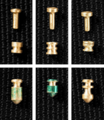Telescoping pin
Telescoping pin
A telescoping pin is a modification of the traditional pin-tumbler design that allows for "pins within pins". In a telescoping design, there are outer and inner pins, all of which must be properly aligned at the shear line to allow the plug to rotate. Though the design of the telescoping pin goes as far back as 1897, companies like Mul-T-Lock and KESO are credited with popularizing and innovating the design in modern pin-tumbler locks.
History
Mul-T-Lock began using telescopic pins in their lock cylinders in 1977.[1] A number of companies currently offer clones of various Mul-T-Lock models, including a clone of the Mul-T-Lock Interactive manufactured by DeGuard. Kenaurd and Angal also offer locks with telescoping pins.
The keyULTRA key platform from UNION is one of the few traditional pin-tumbler locks that incorporates telescoping pins[2].
Hand-crafted pin-in-pin designs are also popular for use in challenge locks to provide deceptive feedback for lockpicking and locksport.
Principles of Operation
Telescoping pins -- also referred to as pin-in-pin and telescopic pins -- function by nesting one smaller pin within a larger, outer pin such that each pin can move independently of the other. Both outer and inner pins may incorporate spools, serrations, and other types of security pin.
Telescoping pins are often found in dimple locks. Locks of this type use traditional keys but each cut comprises two concentric circles of different depths to raise both inner and outer pins to the correct height aligned with the shear line.
There are a number of variation on this design, including a straight-forward type in which the inner and outer pins move independently. Other telescoping pins incorporate an additional, internal spring that exerts force on the inner pin. This style can be found in the driver pins of many dimple locks from Mul-T-Lock.
Gallery
Telescoping pins from the Mul-T-Lock Interactive
Telescoping pins from a challenge lock
References
See also
| This article is a stub. You can help Lockwiki by expanding it. |



